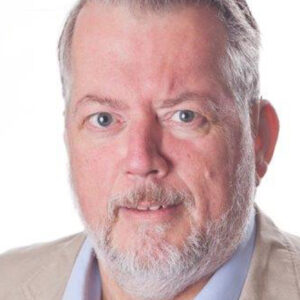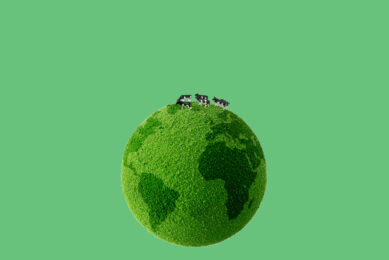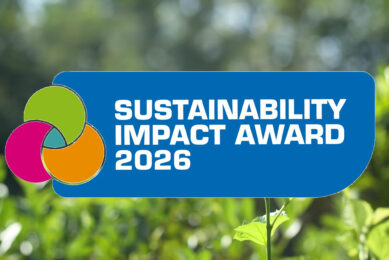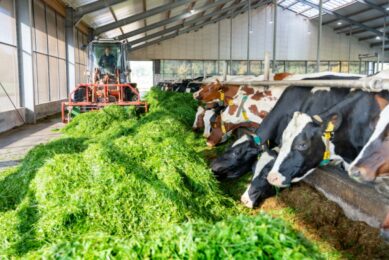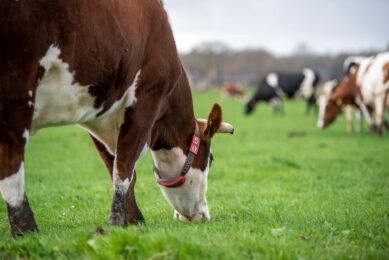Lely: Making life easier for farmer and cow
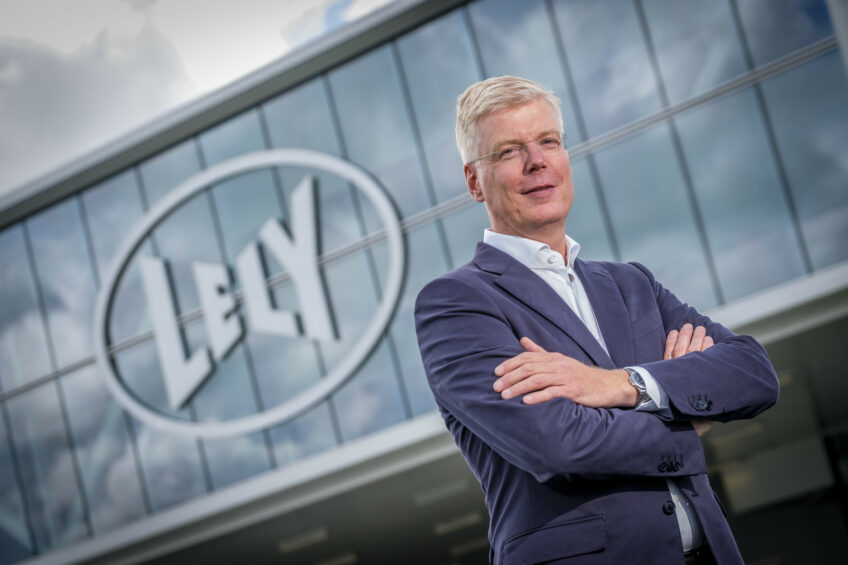
A few years from now Lely must also represent animal and environmental friendly barn concepts and affordable, sustainable manure recycling. The company therefore injects more than €30 million in research and development every year.
If you think about Lely, you think about milking robots. The machine manufacturer from Maassluis is market leader in producing milking robots. Besides this, the company produces other types of equipment, such as manure scrapers and feeding systems. However, the ambitions of CEO Alexander van der Lely stretch further than this. A few years from now Lely must also represent animal and environmental friendlier barn concepts and affordable, sustainable manure recycling.
Mr van der Lely doesn’t actually say it as clearly as written above, but work is currently in progress for the manure processing system in order to make it affordable for dairy farmers, without the dependence of government subsidies. Mr van der Lely is convinced that the current barns, where cows are walking ‘on top of the sewage system’ or where a large part of the floor surface has a moist film of manure and urine, have seen their best times. Emissions are too high and it has a negative effect on animal welfare.
Biography Alexander van der Lely

When can we expect such a new and improved manure processing installation?
“Before 2025.”
That is still a long time from now and manure is a problem now for many countries. Before 2020 maybe?
“Possibly.” Mr van der Lely replies slightly reserved. He wants to share the directions in which his company is looking for new solutions for the dairy farm, but he rather keeps the details to himself for now.
How is Lely paying for the development of new machinery? Is it from the recent sell of the mechanisation division?
“We use the profit to further expand the company, but we have many tasks to take up in the dairy farming area. We spend annually about 6% of the turnover on research and development and use the money for several projects. (Based on the turnover of 2016 this is more than €31.5 million).”
What kind of other projects is Lely working on? The milking robot seems to be a rather mature product.
“I wouldn’t say so. Cars are not a mature product either. Just look at the electric car. The milking robot must become available to a wider audience. Acceptance took a flight since we have started with it 25 years ago. Back then, the milking robot was a question mark, now every dairy farmer is at least considering it. We see room for further improvements, additions and acceptance.”
Will the margin on the milking robot be lower?
“This could be the case, but it doesn’t have to be.”
A higher margin attracts competitors and dairy farmers may start looking for cheaper alternatives.
“If we stop doing our work, this could happen, yes. But we continuously bring new techniques and further improvements on to the market. We let our users benefit from our systems.”
Does Lely continue to believe in the box robot?
“Yes, we have had good experiences with the box robot, which completely surrounds the cow, unlike some other systems. We don’t believe in the rotary parlour or other large-scale systems. Also because the behaviour of the cow is better in smaller groups of 60, 120 or 180 animals, compared to larger groups.”

Does this impact future barn construction?
“We believe the traditional milking parlour will disappear and we do have ideas on what should be done differently.”
Will Lely also enter the barn construction market then?
“Barn construction is a very local business, across the globe. Barn construction is done by partners.”
What do you think of today’s dairy barns?
“I am not too fond of the barns that are used now. The free-range barn can be found worldwide in a number of varieties. The cow is basically walking on top of the sewage system. That is not good in terms of animal welfare, emission and image. Consumers are increasingly looking over our shoulder. When a consumer enters the barn, the first things that hit him are the manure and the emission.”
That is also the case in a barn with the scraper system.
“Correct.”
Lely has ideas on how this can be done differently and better, but has no barn construction aspirations?
“No.”
But there are ambitions in the direction of barn equipment or sales of concepts?
“I said what I said.”
From an image and company perspective, do you have an interest in barns and the dairy farming sector as a whole becoming more sustainable and animal friendly?
“Yes, but the discussion on large scale stalls (‘mega farms’) is typically a Dutch discussion. It is really about what you want to achieve and how to communicate this. This means improved animal welfare and sustainability and fewer emissions.”
Earlier you mentioned the sale of the mechanical division. What was the reason for this?
“We started specialising in dairy farming more and more. Earlier on, we had already disinvested in our division with arable farming machinery. Moreover, looking ahead to the years to come, we would have had difficulty growing and it would have become difficult to maintain our place amid the dealers. Dealing agricultural machinery is a constantly changing business, particularly due to the strong position of ‘full-liners’ (companies with a complete mechanisation line). It was the right moment to sell our mechanization division, which had an annual turnover of €150 to €160 million.”
Shifting to internet sales was not an option?
“That is very difficult for more complex products. Plus, you have to be physically at the farm to adjust the machines and to offer service. Customers value personal contact. Direct contact is important to the farmer. We experience that time after time when selling our milking, feeding and scraper robots.”
Thanks to milking robots, Lely sits on a lot of data on dairy farming. The robots collect all sorts of information about milking, cattle and the farmer’s behaviour. How does Lely use this information?
“Firstly, we do not sit on the data. We have asked our customers if we can use the data, mostly for developing new technologies, because measurement is the key to knowledge. It is also intended to give feedback to the farmer. He or she can log into our system for instance and compare his performance with his/her colleagues’ performances, in order to improve the results. It also provides us with the opportunity to give tailored advice, based on the farmer’s objective.”
You say the farmer. Is it always the farmer who determines how the data is used?
“We also collaborate more broadly in Smart Dairy Farming with FrieslandCampina, CRV and Agrifirm, but that too is the dairy farmer.”
Does Lely also sell data?
“We collaborate with others. That is not always free of charge, as we have to do extra work to find certain data.”
The combination of knowledge, technique and data gives Lely a jump on many others. Can you maintain this advantage?
“If we do well, we can, but finding enough experts is a point of concern. Unfortunately, many organisations in the Netherlands focus on internet and ICT. So the competition on the labour market is fierce. This is why we own a data centre in the Czech Republic and a technology company in Turkey.”
As you said, Lely sees many opportunities to make life easier for dairy farmers, to automate repetitive work and to improve animal welfare. Is it financially feasible to achieve this?
“Over the past 15 years we haven’t had any problems with this.”
What is your personal objective with the company?
“Keeping the company a family owned business and hand it over in good shape to the next generation.”
Is a stock market launch of Lely an option?
“No.”
Authors: Robert Bodde and Klaas van der Horst
Join 13,000+ subscribers
Subscribe to our newsletter to stay updated about all the need-to-know content in the dairy sector, two times a week.


